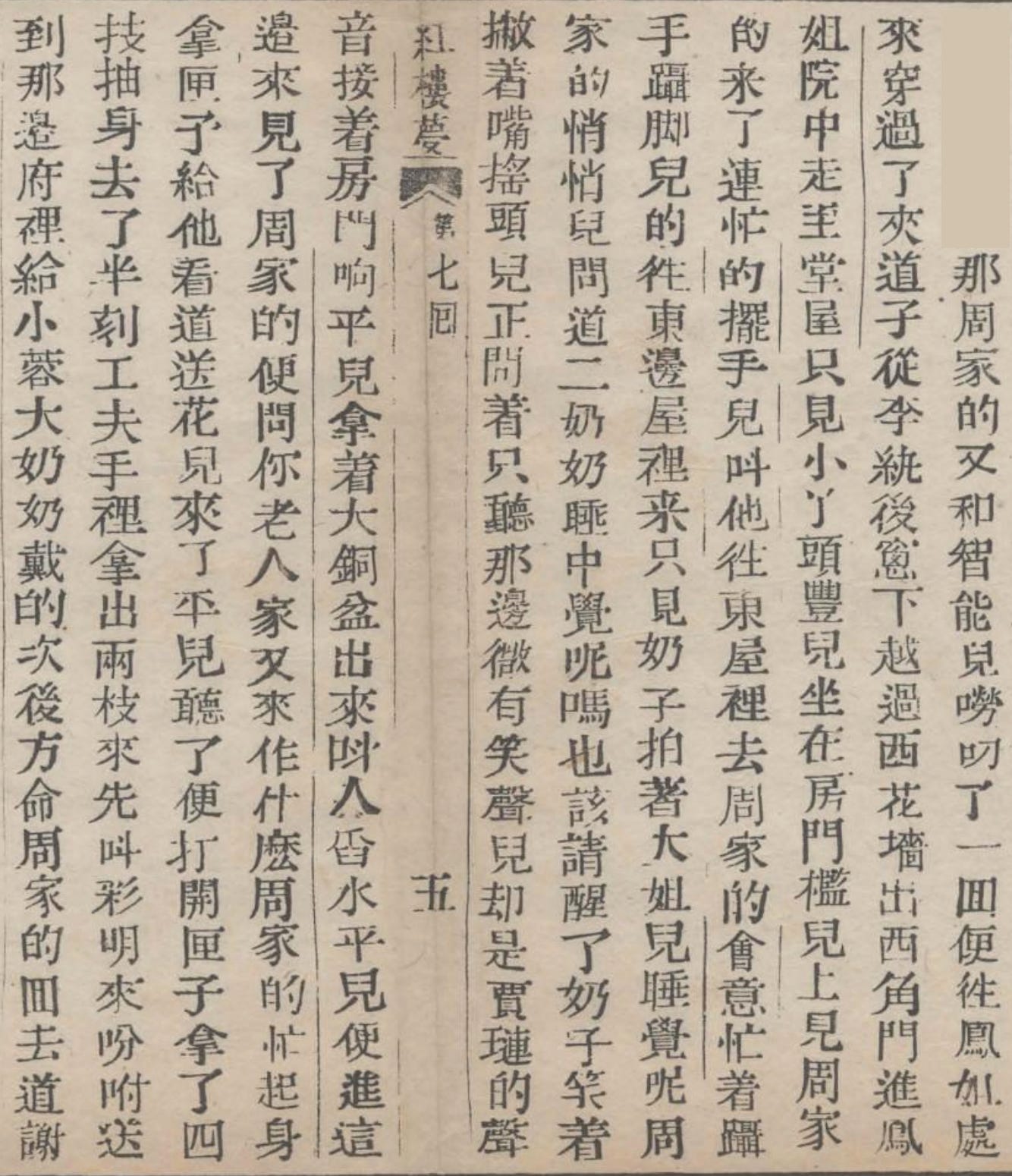Wang Xifeng’s Nap
This is another short interlude that you probably would skip over if you were only reading an English language translation. There’s some ambiguity here, including the brief mention of Wang Xifeng’s child (大姐兒). As we’ll see in tomorrow’s commentary post, though, this is actually a pretty profound passage that reveals a lot about how the author feels about the sexual politics of aristocratic Chinese households of this time.
My Translation
After chatting for a while with Zhihui, Zhou Rui’s wife went to Wang Xifeng’s room. She went through a narrow passageway, went past the back window of Li Wan’s room, went past the flower covered western wall, exited through the side gate on the west, and entered Xifeng’s courtyard.
As she arrive in the main hall, she saw a young maid named Feng’er sitting on the threshold of the inner room. When Feng’er saw Zhou Rui’s wife, she immediately waved her hand and beckoned her to go to the room on the east side. Zhou Rui’s wife understood right away, and tiptoed over to the eastern room. Inside she saw a wet nurse putting Wang Xifeng’s daughter to sleep.
“Is she taking her afternoon nap?” Zhou Rui’s wife quietly asked the wet nurse. “It’s about time she was waking up.”
The wet nurse pursed her lips downward and shook her head.
As Zhou Rui’s wife was asking this, she could hear the faint sound of Jia Lian laughing from the other room. There was then the sound of a door opening, and Ping’er came in carrying a large copper basin, calling for someone to fetch water.
As Ping’er entered the room, she saw Zhou Rui’s wife. “What brings you here again, old aunt?” she asked.
“I’ve come to deliver flowers” answered Zhou Rui’s wife right away, rising quickly to her feet and showing her the box.
Ping’er opened the box, took out four flowers, and slipped out of the room. She returned a little while later with two of them in her hand.
She first called Caiming over and had her deliver them to the Ningguo Mansion for Qin Keqing to wear. And then she returned to Zhou Rui’s wife and asked her to go back and convey her thanks.
Translation Critique
Hawkes
Hawkes translates 彩明 (Caiming), the name of the male servant, as “Sunshine.” The name 彩明 literally means something like “brilliantly bright,” which I suppose means that Hawkes’ name for him is appropriate. However, “Sunshine” is an odd name for a boy in English.
Yang
The Yangs only have the wet nurse shake her head, and miss the connotation presented by her facial expression. The nurse disapproves of what Jia Lian and Wang Xifeng were doing; more on that disapproval in tomorrow’s commentary post.
Chinese Text
那周瑞家的又和智慧兒嘮叨了一回,便往鳳姐處來。穿過了夾道子,從李紈後窗下越過西花牆,出西角門,進鳳姐院中。走至堂屋,只見小丫頭豐兒坐在房門坎兒上。見周瑞家的來了,連忙的擺手兒,叫他往東屋裡去。周瑞家的會意,忙著躡手躡腳兒的往東邊屋裡來,只見奶子拍著大姐兒睡覺呢。周瑞家的悄悄兒問道:「二奶奶睡中覺呢,也該清醒了。」奶子笑著,撇著嘴,搖頭兒。正問著,只聽那邊微有笑聲兒,卻是賈璉的聲音。接著房門響,平兒拿著大銅盆出來叫人舀水。平兒便進這邊來,一見了周瑞家的,便問:「你老人家又來作什麼?」周瑞家的忙起身,拿匣子給他看,道:「送花兒來了。」平兒聽了,便開啟匣子,拿了四枝,抽身去了。半刻工夫,手裡拿出兩枝來,先叫彩明來,吩咐送到那邊府裡給小蓉大奶奶戴的,次後方命周瑞家的回去道謝。
Translation Notes
It might surprise you to see a contemporary and common word like 嘮叨 (to chatter; to talk on and on) in a book like Dream of the Red Chamber. Part of the joy of reading this book is discovering the author’s incredible grasp of the different registers of the Chinese language.
豐兒, or Feng’er, is another personal maid of Jia Lian and Wang Xifeng. She’s not quite as prominent in the book as Ping’er.
躡手躡腳 means to walk on tiptoe or to walk gingerly. Zhou Rui’s wife understood right away from Feng’er that Wang Xifeng was going to sleep.
大姐兒 is confusing, since it’s the first mention that we have of Wang Xifeng’s daughter. She has not yet been given a name, and is presumably called 大姐兒 for the moment because she is the first girl born in her generation in the Jia family. The hint is the use of 奶子, or “wet nurse.” As usual, Cao Xueqin has slyly introduced a character who will later become important without formally introducing that character. You can think of it like a film director slowly introducing the main characters to the audience by showing them in action, rather than formally introducing them.
撇嘴 means to move the corners of one’s mouth downward, usually to express disdain, disgust, or unhappiness.
你老人家 seems to be somewhat derogatory in this context. Ping’er is demonstrating her authority by asking the very direct “你又來作什麼?” (“What are you doing here again?”) However, it would probably be wrong to translate 你老人家 as something like “you old hag,” since it’s not quite that derogatory. It’s hard to get the right flavor here because the phrase is pretty ambiguous and neutral.
彩明, or Caiming, is the name of a young male servant in Wang Xifeng’s household who often acts as a scribe or messenger.



